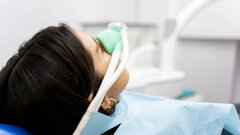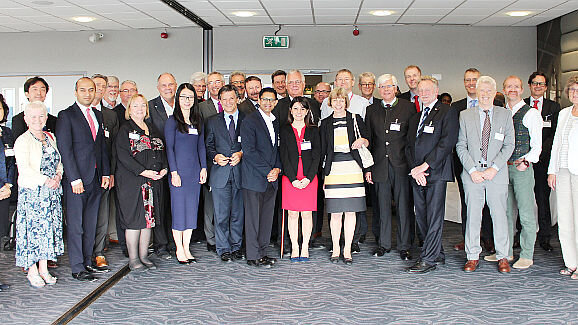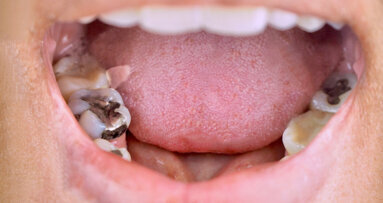LONDON, UK: Limiting the use of amalgam in dentistry is a task that needs a combined effort by various actors in and outside of the health care sector, the organisers of a meeting of 50 senior oral leaders in London have agreed. However, by phasing down the material, the profession will have a rare opportunity for more prevention-focused oral health care in the future, they said.
“I was very impressed by the commitment of the major dental community stakeholder to a measurable, equitable and sustainable phase-down of dental amalgam use, as well as the recognition that ‘dentistry can’t do this alone’. This will need the engagement of other actors such as other health professions, the industry and most importantly civil society,” commented Julian Fisher, resource person for the United Nations Environment Programme Global Mercury Partnership Area on Waste Management.
At the meeting, senior oral health leaders from around the globe came together to discuss pathways for reducing the use of amalgam not only in the UK but also on an international level. The conference took place in mid-July at King’s College London Dental Institute in cooperation with Newcastle University’s School of Dental Sciences and the University of Leeds’s School of Dentistry. In addition to presentations on phase-down case studies, such as the UNEP–WHO East Africa project, the multi-day event provided an overview of minimally invasive dentistry programmes. A particular focus was on improved and newly developed materials and the impact the transition to these materials could have on the dental profession in the long run.
“The complexity of something seemingly as simple as changing a material is remarkable,” said the Dental Institute’s Executive Dean, Prof. Dianne Rekow. “Indeed, this ‘simple’ change has ripple effects that change the philosophy and practice of dentistry, as well as the economies of health care.”
“One of the most impressive features of the symposium was the willingness of the participants to explore the implications and interdependencies of the ripples and assertively work toward finding ways to improve both the environment and health,” she stated further.
Various initiatives have been implemented worldwide since representatives of over 190 countries signed the Minamata Convention on Mercury in Japan three years ago, which agreed on a mercury ban in a variety of products, as well as a phase-out of amalgam. While its use in developing countries is declining, the mercury-containing restorative remains the material of choice in developing countries around the world.
BELFAST, UK: The phase-out of dental amalgam is currently taking place in a number of countries owing, in part, to its deleterious effects on the natural ...
LONDON – For over 150 years, the Westminster Hospital in London took care of the sick and disabled until making way for the Queen Elizabeth II ...
LONDON, UK: Glass ionomer cements have significantly advanced in the last decade and have become a viable option for restorative dental treatment. Next ...
LONDON, UK: Almost nine years in the making, the International Orthodontic Congress (IOC) returned to London yesterday with an impressive first day that saw...
LONDON, UK: MIS Implants Technologies launched a new implant at a special event in London today that promises immediate biological benefits for better ...
LONDON, UK: Celebrating the 50-year anniversary of the first successful osseointegrated implant ever placed in a patient, experts from all around the globe ...
LONDON, UK: At the upcoming Association of Dental Implantology (ADI) Masterclass in London, the developer of the All-on-4 surgical protocol, Dr Paulo Malo ...
LONDON, UK: In the dental clinic setting, communication is key to both successful results and satisfaction. At a recent exhibition, titled “Heads up! ...
LONDON, UK: The 2024 Osstem-Hiossen Meeting in Europe will be held in London on 22 and 23 November at the iconic Wembley Stadium. Over 16 world-class ...
LONDON, England: The SureSmile 2025 Global Orthodontics Symposium, which took place on 13 and 14 September in London, brought together orthodontic ...
Live webinar
Tue. 24 February 2026
6:00 pm UTC (London)
Prof. Dr. Markus B. Hürzeler
Live webinar
Tue. 24 February 2026
8:00 pm UTC (London)
Prof. Dr. Marcel A. Wainwright DDS, PhD
Live webinar
Wed. 25 February 2026
4:00 pm UTC (London)
Prof. Dr. Daniel Edelhoff
Live webinar
Wed. 25 February 2026
6:00 pm UTC (London)
Live webinar
Thu. 26 February 2026
1:00 am UTC (London)
Live webinar
Tue. 3 March 2026
4:00 pm UTC (London)
Dr. Omar Lugo Cirujano Maxilofacial
Live webinar
Wed. 4 March 2026
1:00 am UTC (London)
Dr. Vasiliki Maseli DDS, MS, EdM



 Austria / Österreich
Austria / Österreich
 Bosnia and Herzegovina / Босна и Херцеговина
Bosnia and Herzegovina / Босна и Херцеговина
 Bulgaria / България
Bulgaria / България
 Croatia / Hrvatska
Croatia / Hrvatska
 Czech Republic & Slovakia / Česká republika & Slovensko
Czech Republic & Slovakia / Česká republika & Slovensko
 France / France
France / France
 Germany / Deutschland
Germany / Deutschland
 Greece / ΕΛΛΑΔΑ
Greece / ΕΛΛΑΔΑ
 Hungary / Hungary
Hungary / Hungary
 Italy / Italia
Italy / Italia
 Netherlands / Nederland
Netherlands / Nederland
 Nordic / Nordic
Nordic / Nordic
 Poland / Polska
Poland / Polska
 Portugal / Portugal
Portugal / Portugal
 Romania & Moldova / România & Moldova
Romania & Moldova / România & Moldova
 Slovenia / Slovenija
Slovenia / Slovenija
 Serbia & Montenegro / Србија и Црна Гора
Serbia & Montenegro / Србија и Црна Гора
 Spain / España
Spain / España
 Switzerland / Schweiz
Switzerland / Schweiz
 Turkey / Türkiye
Turkey / Türkiye
 UK & Ireland / UK & Ireland
UK & Ireland / UK & Ireland
 International / International
International / International
 Brazil / Brasil
Brazil / Brasil
 Canada / Canada
Canada / Canada
 Latin America / Latinoamérica
Latin America / Latinoamérica
 USA / USA
USA / USA
 China / 中国
China / 中国
 India / भारत गणराज्य
India / भारत गणराज्य
 Pakistan / Pākistān
Pakistan / Pākistān
 Vietnam / Việt Nam
Vietnam / Việt Nam
 ASEAN / ASEAN
ASEAN / ASEAN
 Israel / מְדִינַת יִשְׂרָאֵל
Israel / מְדִינַת יִשְׂרָאֵל
 Algeria, Morocco & Tunisia / الجزائر والمغرب وتونس
Algeria, Morocco & Tunisia / الجزائر والمغرب وتونس
 Middle East / Middle East
Middle East / Middle East


















































To post a reply please login or register